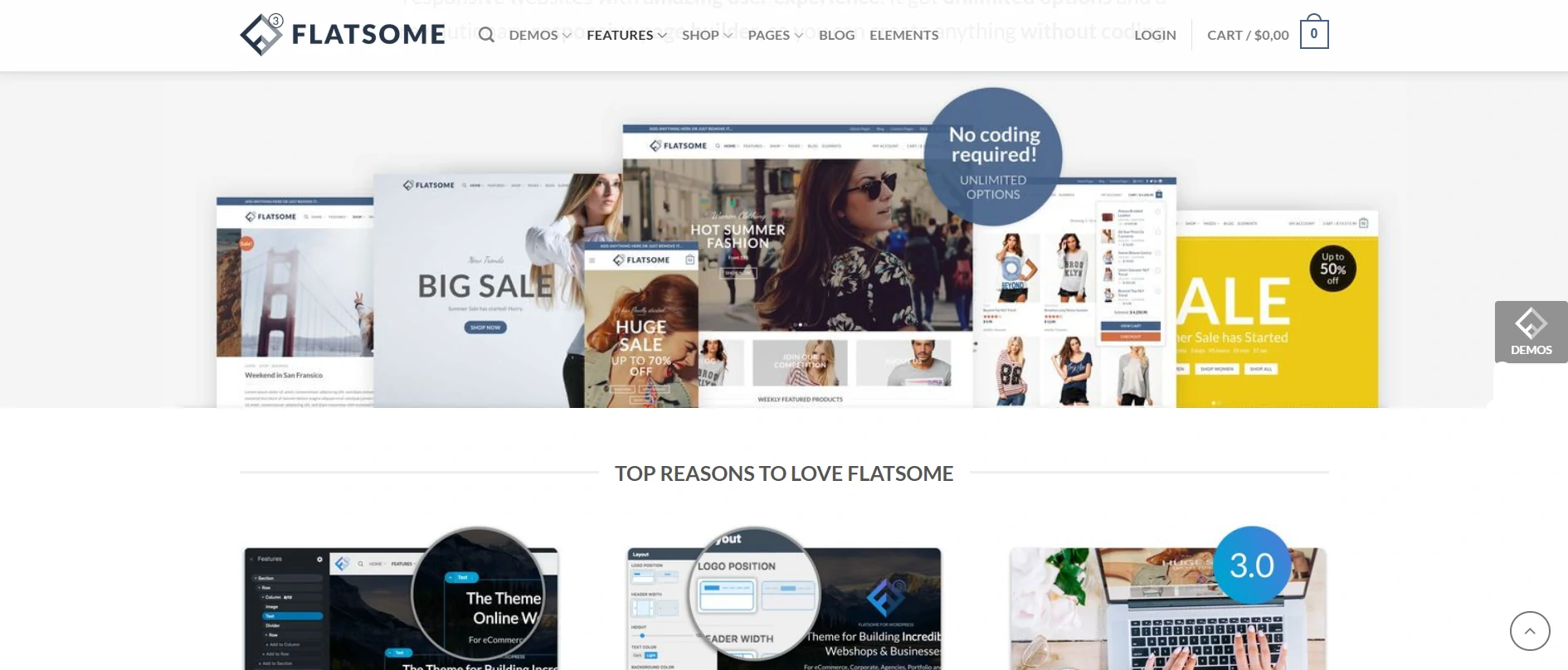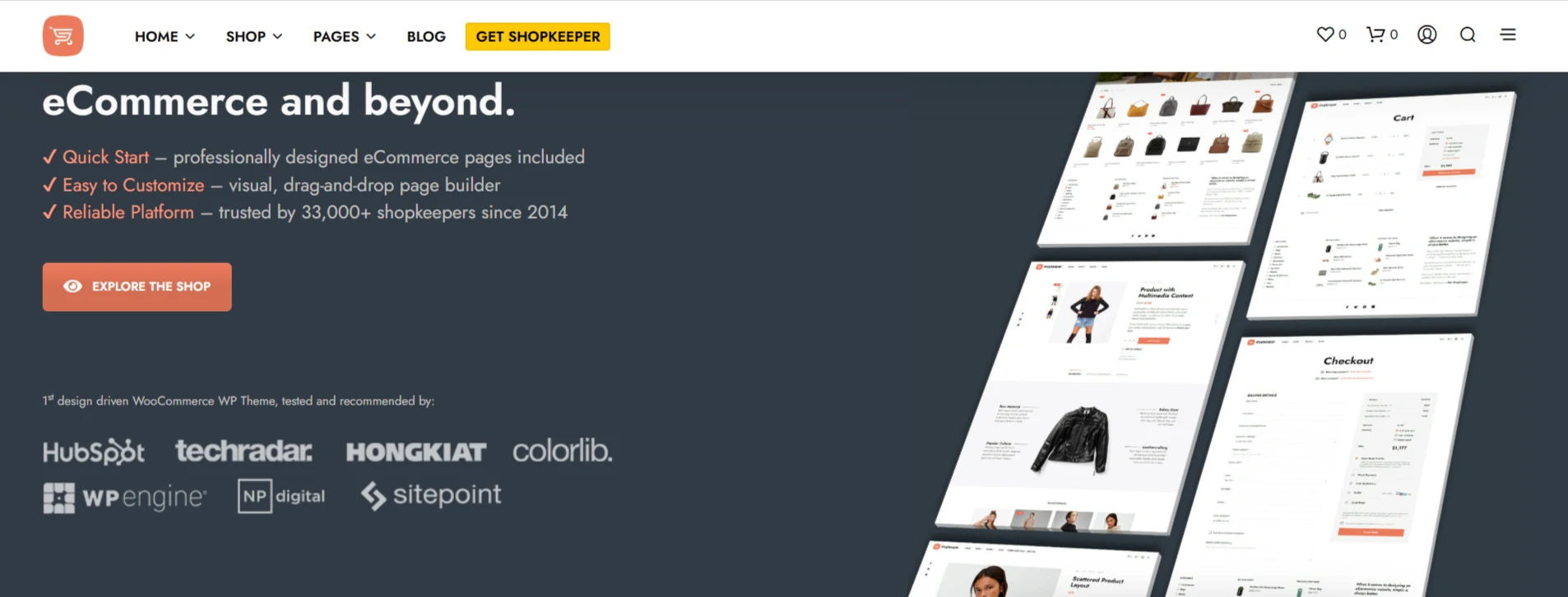best ecommerce WordPress themes Introduction to Ecommerce WordPress Themes
E-commerce has revolutionized the way businesses interact with customers, providing an efficient platform for buying and selling products online.
Within this landscape, WordPress has emerged as a leading content management system, accommodating a variety of e-commerce functionalities through the use of specialized themes.
WordPress themes designed for e-commerce play a crucial role in creating an impactful online presence as they encompass not only aesthetics but also performance, user navigation, and overall functionality tailored to enhance the shopping experience.
Choosing the right e-commerce WordPress theme is fundamental for businesses seeking to optimize user experience.
A polished theme ensures that customers can easily navigate through product listings, view descriptions, and complete transactions smoothly.
The visual appeal of a site, influenced heavily by its WordPress theme, significantly impacts first impressions, which can either draw customers in or discourage them from engaging further.
From layout designs to color schemes, the right theme can align well with a brand’s identity while also catering to user expectations.
Moreover, the effectiveness of an e-commerce site is frequently assessed through various performance metrics such as conversion rates, bounce rates, and overall engagement.
An appropriately selected WordPress theme can enhance page load speed and mobile responsiveness, critical elements in today’s digital marketplace.
As mobile commerce continues to rise, ensuring that a WordPress e-commerce theme is optimized for mobile devices is no longer optional but essential.
In conclusion, integrating a well-crafted ecommerce WordPress theme is invaluable for businesses aiming to thrive in the digital marketplace.
By focusing on the right theme, companies can increase user satisfaction, drive sales, and ultimately achieve success in their online endeavors.
Key Features to Look for in Ecommerce WordPress Themes
When selecting a WordPress theme for your e-commerce website, it is imperative to consider specific features that can significantly enhance user experience and functionality. One of the foremost aspects is responsive design.
This feature ensures that your website looks polished and operates seamlessly across various devices, including desktops, tablets, and smartphones. A responsive theme not only improves user engagement but also positively impacts SEO, which is crucial for driving traffic to your store.
SEO optimization is another critical feature to seek in e-commerce WordPress themes. A theme that offers built-in SEO capabilities can facilitate better ranking in search results.
Look for themes that support optimal code structures, fast loading times, and accessibility, as these elements contribute to higher visibility in search engines. This can ultimately lead to increased traffic and sales for your online business.
Payment gateway integration is also essential for any e-commerce site. A robust WordPress theme should support multiple payment methods, ensuring that customers can complete transactions through their preferred options.
Themes compatible with popular payment systems like PayPal, Stripe, and credit card processors guarantee a smoother checkout process, which can reduce cart abandonment rates significantly.
Another crucial aspect is compatibility with WooCommerce. As one of the most widely used e-commerce plugins for WordPress, WooCommerce offers extensive features for managing products, inventory, and orders.
Themes that are specifically designed to complement WooCommerce will provide a more streamlined experience in setting up your online store.
Lastly, customizable layouts can greatly enhance your e-commerce site’s aesthetic appeal and functionality. A theme that allows for easy modifications enables you to tailor your website to reflect your brand effectively while maintaining usability.
By considering these key features in WordPress themes for e-commerce, you can create a compelling online shopping experience that meets the needs of your customers.
Top Free best Ecommerce WordPress themes
In the increasingly competitive landscape of online retail, selecting the right theme is crucial for establishing a successful e-commerce store.
Fortunately, many free WordPress themes offer professional designs and essential features tailored for e-commerce functionalities.
Below are some of the top free WordPress themes that can effectively cater to various online store needs.
1- Astra WordPress themes Ecommerce
One excellent choice is Astra, a lightweight and customizable theme suitable for businesses of all sizes. Astra supports popular page builders such as Elementor and Beaver Builder, enabling users to create unique layouts easily.
It also integrates seamlessly with WooCommerce, ensuring that features like product galleries and checkout processes work smoothly, making it a key contender among WordPress themes for e-commerce.

2- Storefront WordPress themes Ecommerce
Another strong option is Storefront, developed by the creators of WooCommerce. Storefront boasts a complete integration with WooCommerce, enhancing its usability for online retailers.
Its clean and minimalistic design allows products to take center stage, making it a suitable selection for businesses focused on selling physical products. Moreover, its customizable layout options further allow businesses to modify their sites according to their branding needs.
3- Hestia WordPress themes for Ecommerce
For those looking for a more modern design, the Hestia theme is recommended. With its sleek and professional layout, Hestia is especially beneficial for digital products and service-based businesses.
It also features compatibility with WooCommerce, ensuring an excellent e-commerce experience. Additionally, its one-page layout can be particularly advantageous for startups wanting a straightforward online presence.
Considering the variety of options available, small businesses and startups can find suitable WordPress themes for e-commerce among these free selections. Each theme provides unique features aimed at facilitating a user-friendly shopping experience and enhancing store functionality.
By carefully selecting a theme tailored to specific business needs, entrepreneurs can create compelling online storefronts without incurring significant expenses.

Top Premium WordPress Themes Ecommerce
When it comes to establishing a thriving online store, the choice of WordPress themes for e-commerce can significantly impact your business’s success.
Premium themes are designed to offer advanced features, greater customization options, and enhanced performance, making them a suitable choice for those serious about their e-commerce venture.
Here, we will explore several notable premium WordPress themes for e-commerce, highlighting their pricing, unique features, and attributes that set them apart in a competitive market.
1- Flatsome WordPress Themes Ecommerce
One leading option is Flatsome, which is widely recognized for its versatility. Priced at around $59, this theme offers extensive customization through its built-in page builder.
Flatsome is responsive and optimized for speed, ensuring a smooth user experience, which is crucial for e-commerce websites.
Its standout feature is the ability to create unique layouts for product pages, allowing sellers to tailor their offerings visually.

2- Shopkeeper WordPress Themes Ecommerce
Another excellent choice is Shopkeeper. Costing about $59, it provides an intuitive setup process and extensive support documentation. Shopkeeper also includes various pre-built demos that can be imported with a single click, which is especially beneficial for those new to e-commerce.
Additionally, it integrates seamlessly with WooCommerce, making it a top contender for anyone looking to manage their online store effectively.

3- Divi WordPress Themes Ecommerce
For those seeking a more minimalistic approach, Divi is a standout theme priced at $89 for an annual membership. It features a powerful visual builder that empowers users to create custom e-commerce layouts easily.
Divi’s vast library of design elements and its capacity for A/B testing enhance its appeal to sellers looking to optimize their website for conversions.
In summary, investing in premium WordPress themes for e-commerce such as Flatsome, Shopkeeper, and Divi can dramatically improve your online store’s capabilities.
Each option offers unique features that cater to various business needs, enabling e-commerce entrepreneurs to present their products effectively and efficiently.
How to Choose the Right Theme for Your E-commerce Store
Choosing the appropriate WordPress theme for your e-commerce store is a fundamental aspect of establishing a successful online presence. First and foremost, it is essential to align your theme selection with your business goals.
Identify what you aim to achieve with your online store and ensure that the theme accommodates necessary features, such as product displays, payment gateways, or inventory management systems.
Next, consider your target audience.
- Understanding your customers’ preferences and shopping behaviors can greatly influence the aesthetic and functional aspects of your selected theme.
- If your audience appreciates a clean and minimalist design, opt for themes that reflect that style.
- Conversely, if your products are geared towards a younger demographic, look for vibrant and engaging designs that support their shopping experience.
- An ideal e-commerce theme should resonate with your brand image while enhancing usability.
- Product offerings are another crucial factor in your theme decision.
- The nature and variety of your products dictate which layout and features will serve you best.
- A store focusing on a single type of product may benefit from a specialized theme that highlights key aspects, while a multi-category store might require a more versatile layout to effectively showcase various offerings.
Comparing the customizability of different WordPress themes for e-commerce can also guide your selection process.
Additionally, leveraging demo versions of WordPress e-commerce themes is vital. Testing demos allows you to evaluate the functionality and suitability of a theme before committing to it.
Furthermore, carefully reviewing user feedback and ratings can provide insights into the usability and performance of a theme.
This gathered information enables a well-informed decision, ultimately enhancing your e-commerce store’s performance and user satisfaction.
In conclusion, careful consideration of your business goals, target audience, and product offerings will significantly aid in selecting the right WordPress theme for your e-commerce store.
Combining these factors with practical testing and user reviews paves the way for an effective online platform.
Customizing Your E-commerce WordPress Theme
Once you have selected a WordPress theme for your e-commerce site, the next step is customization. Customizing your e-commerce WordPress theme allows you to tailor the site’s appearance and functionality to suit your brand and the needs of your customers.
This process begins with altering layouts, which can play a critical role in user experience. Many themes provide various layout options that can be adjusted to create a unique look, such as grid or list formats for product displays.
- One of the most effective ways to customize your WordPress theme is by using page builders. These tools enable users to drag and drop elements to organize content without requiring coding skills.
- Page builders often come with pre-designed templates that can be further customized to suit your aesthetic preferences and branding.
- When using a page builder, ensure that your chosen layout remains responsive, meaning it looks good on devices of all sizes.
Implementing branding elements is another crucial aspect of theme customization.
- This includes using your brand colors, fonts, and logos throughout the site.
- Consistency in design helps to create a cohesive brand identity, which can enhance customer trust and loyalty. Additionally, you should pay attention to the site’s usability.
- Ensuring easy navigation, fast loading times, and clear calls-to-action are essential for keeping visitors engaged and increasing the likelihood of conversions.
Lastly, maintaining design consistency throughout your site is vital.
- This involves ensuring that product pages, blog sections, and any other elements share a unified look and feel.
- By adhering to a consistent design framework, you can improve the user experience, ultimately driving better results for your e-commerce business.
- Through thoughtful customization of your WordPress themes for e-commerce, you can create a professional and engaging online store.
Optimizing Your E-commerce Theme for SEO
Search Engine Optimization (SEO) plays a crucial role in enhancing the visibility of e-commerce websites in search engine results.
- By optimizing your WordPress themes for e-commerce, you can significantly improve the likelihood of attracting organic traffic.
- A well-optimized website not only drives visitors but also converts them into customers, making SEO a vital aspect of any e-commerce strategy.
- One of the first steps in optimizing your e-commerce theme involves the meticulous selection of appropriate keywords.
- These should align with your product offerings, ensuring they resonate with potential customers.
- Employing tools like Google Keyword Planner can assist in pinpointing relevant keywords with adequate search volumes.
- Incorporating these keywords naturally throughout your website, particularly in product descriptions and headings, enhances your chances of being discovered by search engines.
Next, structuring URLs correctly is essential.
- Clean, descriptive URLs that contain your targeted keywords can improve both user experience and SEO.
- For instance, instead of a URL like www.example.com/product123, a more optimized version would be www.example.com/handmade-ceramic-mugs.
- This clarity aids search engines in understanding the content of your pages.
Image optimization is another critical area.
- Since e-commerce relies heavily on visuals, it is imperative to ensure that images are not only of high quality but are also optimized.
- Utilize descriptive file names and alt texts that incorporate relevant keywords to improve image indexing.
- Additionally, using plugins such as Yoast SEO or All in One SEO can enhance your site’s overall SEO capabilities, offering further assistance in optimizing meta tags and sitemaps.
By employing these techniques when utilizing WordPress themes for e-commerce, you can substantially enhance your website’s visibility on search engines and ensure a better user experience.
This strategic approach can lead to increased traffic and ultimately drive sales for your online store.
Common Mistakes to Avoid When Choosing E-commerce Themes
Selecting a suitable WordPress theme for an e-commerce site can be a daunting task, particularly when numerous options are available.
It is imperative to avoid specific pitfalls that can substantially undermine the overall performance and usability of your online store.
One common mistake is overloading the site with unnecessary features.
- While it may be tempting to choose a theme that offers a plethora of functionalities, excessive features can create a cluttered user interface.
- This can result in a confusing shopping experience, deterring potential customers from completing their purchases.
- Therefore, it is crucial to select a theme that focuses on essential features aligned with your business needs.
Another significant aspect to consider is mobile optimization.
- With the increasing use of mobile devices for online shopping, neglecting mobile responsiveness can be detrimental.
- A poorly optimized theme can lead to difficult navigation and misaligned content on smaller screens, ultimately driving mobile shoppers away.
- It is essential to ensure that the chosen e-commerce theme is fully responsive, providing an optimal shopping experience across all devices.
Additionally, loading speed is a critical factor that often gets overlooked.
- A slow-loading website can frustrate users, resulting in higher bounce rates and abandoned carts.
- When selecting a WordPress theme for e-commerce, it is essential to evaluate its performance speed.
- Features such as heavy graphics and animations can negatively impact loading times.
- Hence, opting for a theme designed with speed in mind will enhance user experience and can positively affect search engine rankings, ultimately leading to increased traffic and sales.
In conclusion, being mindful of these common mistakes—overloading features, neglecting mobile optimization, and ignoring loading speed—can aid in making an informed decision when selecting the perfect WordPress themes for e-commerce.
By choosing wisely, you can create a compelling and efficient online shopping environment that caters to your customers’ needs.
Conclusion: The Future of WordPress Themes Ecommerce
In the rapidly evolving landscape of e-commerce, WordPress Themes Ecommerce have become a pivotal element for online retailers looking to establish a significant digital presence.
Throughout this guide, we have explored various aspects of WordPress Themes Ecommerce tailored for e-commerce, highlighting their crucial role in enhancing user experience and operational efficiency.
As we look ahead, several key trends are set to shape the future of e-commerce themes on the WordPress platform.
One of the foremost trends is the growing emphasis on mobile-first design.
- With a substantial portion of online shopping now conducted via smartphones and tablets, it is imperative for WordPress themes to be optimized for mobile usage.
- Themes that prioritize responsive design enable e-commerce businesses to provide seamless navigation and fast loading times, which significantly improve customer satisfaction and conversion rates.
- Another significant trend is the integration of artificial intelligence (AI) features into e-commerce WordPress themes.
- AI-driven functionalities, such as personalized product recommendations and chatbots, are becoming increasingly common.
These features not only enhance the user experience but also streamline operations by providing customers with tailored experiences that can boost sales and foster customer loyalty.
Moreover, evolving customer expectations necessitate a shift in how e-commerce platforms are designed. Consumers are increasingly looking for intuitive navigation, visually appealing layouts, and fast checkout processes.
This shift calls for WordPress themes that continually adapt to ensure ease of use while also incorporating attractive designs that reflect brand identity.
Staying informed about these emerging trends is vital for developers, designers, and business owners.
By embracing mobile-first approaches, AI enhancements, and evolving consumer preferences, stakeholders in the WordPress e-commerce space can maintain a competitive edge, ensuring their platforms are not only functional but also appealing to a discerning audience.



